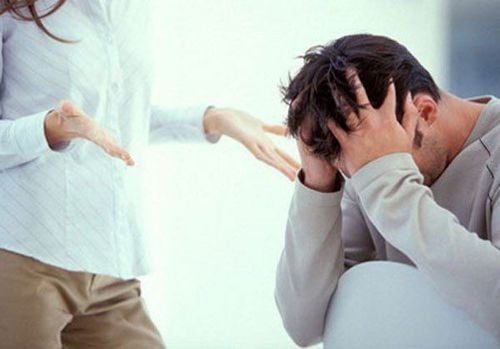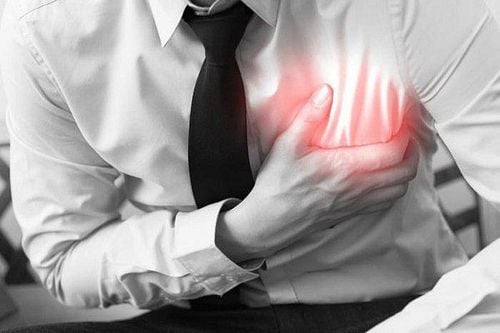This is an automatically translated article.
Like the rest of the body, a man's penis changes as he ages, including changes in shape, function, and potential for health problems. Most of these changes are normal and do not require medical attention. But there are symptoms that can affect the sexual and urinary function of the penis to the point where medical evaluation is necessary.
1. How does the penis change as you age?
Once the penis stops growing and maturing, usually around the age of 20, it won't change much for the next few years. But when plaque begins to build up in arteries throughout the body and testosterone levels drop (usually around the age of 40), changes in the penis can become apparent.
1. 1. Changes in Appearance Penile retraction can occur with aging, but this should not affect the function of the penis and does not require medical treatment unless you are concerned. function of the penis.
Testicular atrophy (shrink testicles) is also a normal part of the aging process. Combined with the loss of skin elasticity throughout the body and the effects of gravity, the scrotum and penis can both sag and look more wrinkled with age. Reduced blood flow can also fade the color of the penis later on.
1. 2. Changes in sexual function As you get older, you may notice changes in sexual function, especially in the frequency and nature of erections.
Inability to achieve and maintain an erection long enough for all partners to be satisfied, or erectile dysfunction (ED), which is more common in older adults. You may also be concerned when you notice that the erection level is not as firm as it was when you were younger.
The penis also tends to become less sensitive over the years. That means it may take longer and more stimulation for you to become more euphoric than in previous years.
Desensitization is common and often leads to erectile dysfunction and difficulty achieving orgasm. Sometimes these orgasms can also feel less satisfying. And the natural enlargement of the prostate as you age can also reduce semen volume, making you feel like you're not as strong as you used to be.
According to a study in the International Journal of Impotence Research, your chances of having a curved penis - a condition known as Peyronie's disease - increase as you reach the age of 50. But Peyronie's disease can occur at any age. year old.
1. 3. Changes in urinary function As you get older, the growing prostate can put pressure on your bladder and urethra. You may have to urinate more often, and the flow is weaker with less urine being released when you urinate.
Medical conditions affecting the penis can become more common as you get older. You may experience pain with urination or an erection, both of which can be caused by some chronic or temporary illness.
Lesions or rashes on the penis can be a sign of infection or other health problems. Likewise, the appearance of dark spots on the penis can be harmless penile melanoma or, in rarer cases, a sign of penile cancer.

Thay đổi chức năng tiết niệu có liên quan đến sự thay đổi của dương vật
Prostate cancer: This is the most common cancer in men, aside from skin cancer. If left untreated, prostate cancer can cause changes in such as: changes in the penis, changes in urination, changes in sexual function. Once you're over 50, you should see your doctor at least once a year for prostate cancer screening. You may consider starting screening earlier if you have a family history of prostate cancer or other risk factors. Penile cancer: Penile cancer is a rare complication that occurs almost exclusively in older men with uncircumcised penises. Common early symptoms of penile cancer include: The foreskin cannot be retracted over the shaft of the penis. The foreskin feels stuck in place. Pain or lesions appear on the foreskin or glans of the penis. See your doctor right away if you have any of these symptoms.
2. Why does the penis change with age?
Why does aging cause all these changes in the penis? It is usually a result of the normal aging process, with the majority being caused by:
Decreased blood flow due to plaque build-up in the arteries and loss of elasticity of blood vessels throughout the body as you age . Loss of smooth muscle cells in the penis - they are largely replaced by collagen cells. Decreasing levels of testosterone - the hormone that promotes sex drive, positive mood and many bodily functions. Chronic pain in your penis could indicate a problem that requires medical attention. If pain occurs with urination, possible causes include:
Infection Kidney or bladder stones Sexually transmitted disease Penile cancer Priapism (erectile that lasts 4 hours or more). Peyronie's disease, which causes penile curvature, usually develops after years of accumulation of scar tissue from rough sex, sports injuries, or other accidents that can cause the penis to slightly curve.
3. Does the penis stop ejaculating when old?
The amount of ejaculation tends to decrease as you get older. But if you notice a sudden change, especially in the texture, color, and amount of ejaculate, talk to your doctor. Generally, this change is gradual and is simply the result of aging.
Another change you may see as you get older is hemophilia. When this happens, the semen becomes bloody and red. This may indicate an inflamed or infected prostate gland. This condition is relatively common as you get older.
If you can no longer achieve an erection or become less sexually aroused, you may also not be able to ejaculate. But with erectile dysfunction, the possibility of delayed ejaculation is still possible for most men.

Sự thay đổi của dương vật có liên quan đến vấn đề xuất tinh
4. The change of the penis when should see a doctor?
The following changes should prompt you to see a doctor or urologist:
Sudden changes in libido and/or sexual function. Bleeding while urinating or ejaculating. Lesions, rashes, goosebumps or other noticeable changes to the shape of the penis. The penis is abnormally curved or curved in the penis. Discharge from the penis. Pain in the penis or scrotum
5. Are there any treatments to change the penis?
Treatment of conditions associated with aging penis often aims to improve function and control symptoms. Some common treatments include:
Erectile dysfunction drugs and other treatments, such as penile prosthesis surgery, to help treat symptoms of the disorder Erectile. These treatments are not a cure for the underlying causes of erectile dysfunction. Surgery or injections for Peyronie's disease to disrupt collagen formation in the penis help reduce penile curvature and relieve other symptoms. Antibiotics or medicine to address urinary symptoms related to a urinary tract infection (UTI) or an abnormally enlarged prostate and to help improve your urine flow. Kegel exercises after a prostatectomy to help you hold your urine if you have prostate problems or other urinary conditions that cause urinary incontinence. Surgery to remove masses or tissue that may affect the shape and function of the penis or harbor cancer cells. The health of your penis and your reproductive and urinary systems are the most important considerations when deciding whether to seek treatment for the changes of an aging penis. And if you adopt a healthy lifestyle and work with your doctor to help prevent or quickly diagnose other conditions that affect the penis, you can better adapt to these changes before they become serious. more severe or problematic over time.
It's best to proactively visit your doctor to get accurate advice about your health status when you notice negative changes in your body.
Vinmec International General Hospital is the address for examination and treatment of many diseases from simple to complex with a team of doctors and experts with many years of experience in the profession. Therefore, customers can completely rest assured and the results of the examination at the hospital.
Please dial HOTLINE for more information or register for an appointment HERE. Download MyVinmec app to make appointments faster and to manage your bookings easily.













